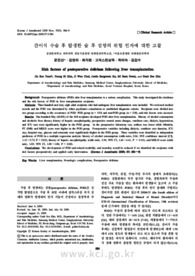

PARTNER
검증된 파트너 제휴사 자료
간이식 수술 후 발생한 술 후 섬망의 위험 인자에 대한 고찰 (Risk factors of postoperative delirium following liver transplantation)
6 페이지
최초등록일 2025.05.28
최종저작일
2009.11

-
미리보기
서지정보
· 발행기관 : 대한마취통증의학회
· 수록지 정보 : Korean Journal of Anesthesiology / 57권 / 5호 / 584 ~ 589페이지
· 저자명 : 윤진선, 김영리, 최지원, 고저스틴상욱, 곽미숙, 김갑수
초록
Background: Postoperative delirium (POD) after liver transplantation is a serious complication. This study investigated the incidence and the risk factors of POD in liver transplantation recipients.
Methods: Three hundred and sixty eight adult recipients who had undergone liver transplantation were included. We reviewed medical records and the POD was determined by either psychiatric consultation or established diagnostic criteria. Recipients were divided into two groups according to the occurrence of POD: POD group (n = 150) and non-POD group (n = 218), and risk factors were assessed.
Results: One hundred fifty (40.8%) of the 368 recipients developed POD after liver transplantation. History of alcohol consumption and alcoholic liver disease, history of hepatic encephalopathy, preoperative mental status changes, ventilator care, dialysis, hypotension, and ICU care were significantly higher in the POD group. In the preoperative laboratory test, sodium was lower while bilirubin, PT (INR) and MELD score were higher in the POD group. Postoperative variables including dialysis, ventilator care duration, ICU stay, hospital stay, glucose and ammonia were significantly higher in the POD group. Three variables were identified as independent predictors of POD in a multiple regression analysis: history of alcohol consumption (odds ratio, 2.04; 95% confidence interval [CI], 1.12−3.72; P = 0.02), history of hepatic encephalopathy (odds ratio, 2.54; 95% CI, 1.46−4.41, P < 0.01), and MELD score (odds ratio, 1.03; 95% CI, 1.00−1.06; P = 0.02).
Conclusions: The development of POD and related morbidity and mortality would be reduced if we identified the recipients with risk factors preoperatively and applied early intervention.영어초록
Background: Postoperative delirium (POD) after liver transplantation is a serious complication. This study investigated the incidence and the risk factors of POD in liver transplantation recipients.
Methods: Three hundred and sixty eight adult recipients who had undergone liver transplantation were included. We reviewed medical records and the POD was determined by either psychiatric consultation or established diagnostic criteria. Recipients were divided into two groups according to the occurrence of POD: POD group (n = 150) and non-POD group (n = 218), and risk factors were assessed.
Results: One hundred fifty (40.8%) of the 368 recipients developed POD after liver transplantation. History of alcohol consumption and alcoholic liver disease, history of hepatic encephalopathy, preoperative mental status changes, ventilator care, dialysis, hypotension, and ICU care were significantly higher in the POD group. In the preoperative laboratory test, sodium was lower while bilirubin, PT (INR) and MELD score were higher in the POD group. Postoperative variables including dialysis, ventilator care duration, ICU stay, hospital stay, glucose and ammonia were significantly higher in the POD group. Three variables were identified as independent predictors of POD in a multiple regression analysis: history of alcohol consumption (odds ratio, 2.04; 95% confidence interval [CI], 1.12−3.72; P = 0.02), history of hepatic encephalopathy (odds ratio, 2.54; 95% CI, 1.46−4.41, P < 0.01), and MELD score (odds ratio, 1.03; 95% CI, 1.00−1.06; P = 0.02).
Conclusions: The development of POD and related morbidity and mortality would be reduced if we identified the recipients with risk factors preoperatively and applied early intervention.참고자료
· 없음태그
-
자주묻는질문의 답변을 확인해 주세요

꼭 알아주세요
-
자료의 정보 및 내용의 진실성에 대하여 해피캠퍼스는 보증하지 않으며, 해당 정보 및 게시물 저작권과 기타 법적 책임은 자료 등록자에게 있습니다.
자료 및 게시물 내용의 불법적 이용, 무단 전재∙배포는 금지되어 있습니다.
저작권침해, 명예훼손 등 분쟁 요소 발견 시 고객센터의 저작권침해 신고센터를 이용해 주시기 바랍니다. -
해피캠퍼스는 구매자와 판매자 모두가 만족하는 서비스가 되도록 노력하고 있으며, 아래의 4가지 자료환불 조건을 꼭 확인해주시기 바랍니다.
파일오류 중복자료 저작권 없음 설명과 실제 내용 불일치 파일의 다운로드가 제대로 되지 않거나 파일형식에 맞는 프로그램으로 정상 작동하지 않는 경우 다른 자료와 70% 이상 내용이 일치하는 경우 (중복임을 확인할 수 있는 근거 필요함) 인터넷의 다른 사이트, 연구기관, 학교, 서적 등의 자료를 도용한 경우 자료의 설명과 실제 자료의 내용이 일치하지 않는 경우
“Korean Journal of Anesthesiology”의 다른 논문도 확인해 보세요!
-
척추측만증 교정수술의 수술 중 및 후 호흡기 및 순환기계 합병증에 대한 폐기능 검사의 임상적 예측성 평가: 후향적 연구 7 페이지
Background: This study was conducted to confirm the predictive power of preoperative pulmonary functions tests (PFTs) for intra- and post-operative cardiopulmonary complications during corrective surg.. -
소아에서 기관내관의 폐쇄에 의해 발생한 폐부종을 동반한 폐출혈 3 페이지
Negative pressure induced pulmonary edema due to upper airway obstruction is a well-recognized problem. However, negative pressure pulmonary hemorrhage is extremely uncommon. We report a child who dev.. -
빗장 아래 팔신경얼기 차단 환자에서의 0.75% 또는 0.5% Ropivacaine의 비교 7 페이지
Background: We performed a prospective, double blind study to compare the clinical effect of vertical infraclavicular brachial plexus block produced by 0.75% vs 0.5% ropivacaine for upper limb surgery.. -
성상신경절 차단 후 초음파로 확인한 국소마취제 분포가 증상에 미치는 영향 5 페이지
Background: The aim of this study is to evaluate the effects of local anesthetic distribution on symptoms using ultrasound image after C6 stellate ganglion block (SGB). Methods: Twenty-six patients u.. -
안과 수술을 위한 마취 관리 7 페이지
Ophthalmic surgery presents challenges for the anesthesiologists, including control of intraocular pressure, prevention and management of the oculocardiac reflex. In addition to understanding ocular a..
문서 초안을 생성해주는 EasyAI
